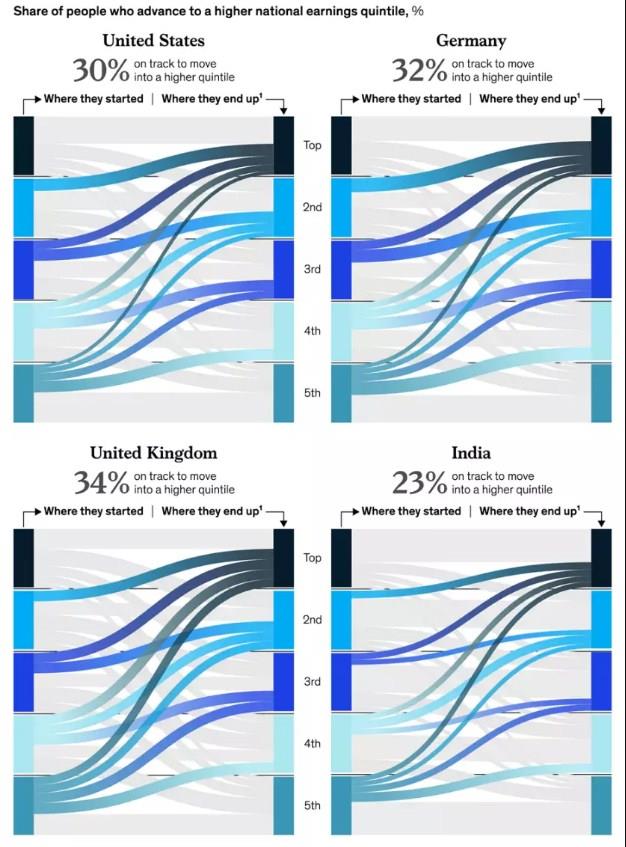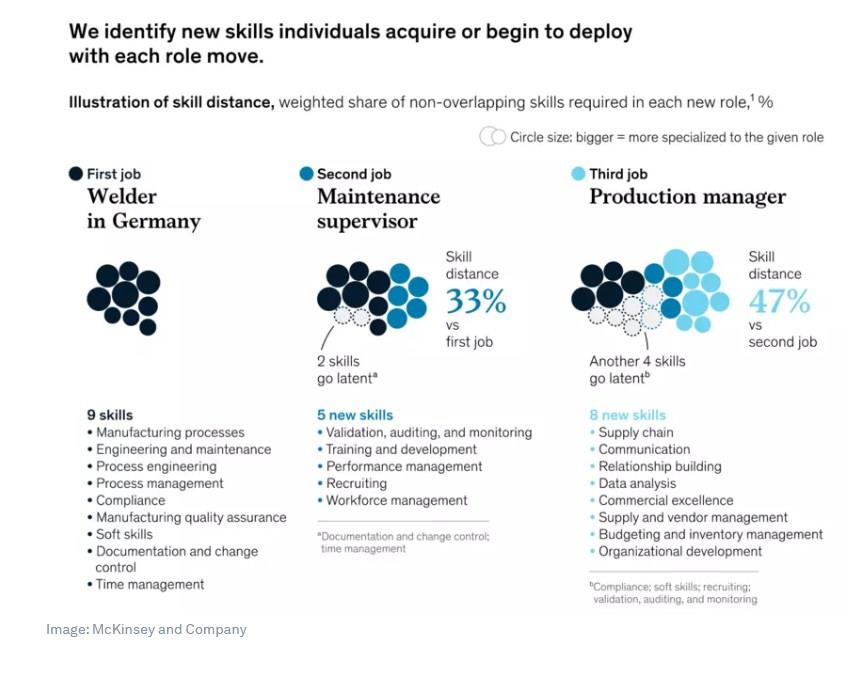by Anu Madgavkar and Sven Smit*
Human capital is often studied in the context of how investments in early childhood development, education, and healthcare translate into a more productive workforce. But human capital is ultimately the potential within each individual.
Its development continues long after formal education ends, as people acquire new skills in the workplace and gain capabilities that they carry with them for the remainder of their careers. This is a critical dynamic, since human capital accounts for two-thirds of the average individual’s wealth. New research from the McKinsey Global Institute finds that half of that value—and often far more for people with less education—is linked to work experience.
We used big data to examine some four million real-world job histories for workers in the United States, Germany, the United Kingdom, and India, paying special attention to the specific bundles of skills required in each role someone held over time and considering how job moves affect earnings.
Here are three key takeaways:
#1 Work experience is a more important driver of incomes for workers with less education
For those who start without the advantage of credentials that signal value to potential employers, adding learning and skills through work experience is the primary strategy for getting ahead in the labor market. People may not have control over factors such as their family upbringing or the quality of their local schools, but they do exercise some degree of choice in the occupations they pursue and the organizations they join—and those choices are especially important for people who start in low-wage jobs.
People accumulate experience and skills with each role they perform throughout a working life. The income growth of a dishwasher who becomes a food prep cook, then a line cook, and eventually a sous chef is almost entirely fueled by techniques and tricks of the trade learned on the job. In addition to enabling someone to acquire skills, work experience gives that person a track record, which is valuable in and of itself for the signal it sends to potential future employers.
Work experience contributes 40 - 43% of average lifetime earnings in the United States, Germany, and the United Kingdom but 58% in India, where fewer people have higher education. In general, people without college degrees who start in low-wage jobs are more reliant on work experience. It contributes 65 - 75% of lifetime earnings for those who begin as tile setters or counter workers in the United States, for example, compared with 35% for physicians or lawyers.
#2 Changing roles can pay off, particularly when people make bold moves
In our sample, roughly a third of US, German, and UK workers, and almost a quarter of Indian workers, are on a path to move up one or more quintiles in estimated lifetime earnings from their career starting points.

Skills derived through experience account for 60 - 80% of lifetime earnings for those who move up but only 35 - 55% for those who stay flat or drop down.
The upwardly mobile groups not only changed roles more frequently; they also made bolder moves that stretched their skills more substantially. With each role change after a first job, we isolate the share of distinct skills required in the new role to determine the “skill distance” of the move. The median skill distance per role move is 25% or more. Upwardly mobile cohorts in the United States and India made moves with an average skill distance of 30 - 40%. Those who stayed flat averaged only 20 - 30%.
#3 Individuals get a lift from early experience in effective organizations
Employers that perform well on metrics linked to organizational health, training, and internal advancement seem to propel people forward. Their employees were more likely to go on to be upwardly mobile. Controlling for differences in occupation, time spent early in a career with an organization that prioritizes learning and development is one of the most influential factors determining someone’s future prospects.

For companies, a cautionary note emerged from the data: 80% of job changes involved people moving to new employers. This points to a major missed opportunity. Workers understand the value of learning and development—and they increasingly feel empowered to move to employers that will provide opportunities to gain new skills and move up. Companies, many of which are facing increased attrition and labor shortages, will need to respond. This calls for a renewed emphasis on coaching and designing internal career paths that give employees more varied portfolios of experience.
Companies have long grappled with the fact that investing in an employee’s development may make that person more attractive to other employers. It may seem counterintuitive to double down on learning and development at a time when workers are growing more mobile—but in fact, it is more important than ever.
*Partner, McKinsey Global Institute and Chair, McKinsey Global Institute, McKinsey & Company, Amsterdam
**first published in: www.weforum.org




 By: N. Peter Kramer
By: N. Peter Kramer
